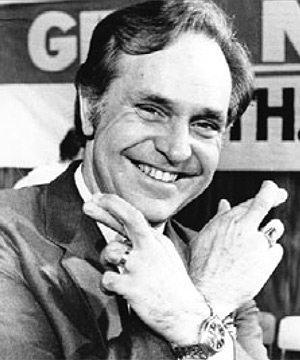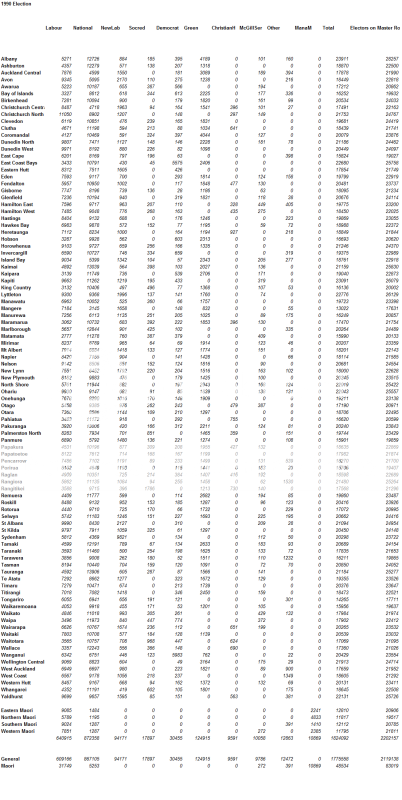You are using an out of date browser. It may not display this or other websites correctly.
You should upgrade or use an alternative browser.
You should upgrade or use an alternative browser.
NZ AHC: Have a government led by a party other than National and Labour
- Thread starter Pericles
- Start date
The answer is obviously Social Credit.

Maybe, but they never got more than two seats. If they were in the time of MMP, then they'd have a much better chance, but unfortuantely for them they arrived a decade and a bit too early.
Have them live a bit longer and end up in the MMP era. Keep up the "protest vote" a bit longer, add in very unhappy Lab/Nat voters and they might win.Maybe, but they never got more than two seats. If they were in the time of MMP, then they'd have a much better chance, but unfortuantely for them they arrived a decade and a bit too early.
Have them live a bit longer and end up in the MMP era. Keep up the "protest vote" a bit longer, add in very unhappy Lab/Nat voters and they might win.
However, by then they would likely decline, leaving N First and Jim Anderton as the main options.
Well, it is just possible that either Labour or National could split. National after 1984 and Labour around 87 -88 but worse than OTL so proto NZ First or New Labour were rather stronger.
I think we need to engineer a definitive split between the majority of the unions and Labour in the 1980s, a messy breakup
Two options:
- Keep Geoffrey Palmer as Labour leader in 1990. Unlike Mike Moore, who in six weeks got a fair amount of goodwill, and narrowed the poll gap from 40 points to 10ish, Palmer was unpopular, terrible at communication, and still keen to push ahead with Rogernomics (c.f. the Telecom Privatisation, the greatest of them all). That election goes from a crushing Labour defeat to a Canadian 1993-style wipeout. National wins 85+ seats, Labour is reduced to three of the four Maori seats, plus three others (David Lange in Mangere, Richard Prebble in Auckland Central, and Larry Sutherland in Avon). The rest go to Jim Anderton's New Labour. Anderton considers himself the "real" Opposition (and on these numbers, might actually be it). With Labour still engrossed in suicidal infighting (Prebble!), New Labour emerges as the clear party of the Left. Sooner or later, they are destined for Government.
- Helen Clark performs terribly in the 1996 leaders debate (in OTL she won easily, shifting Labour from 16 percent to 28 percent). New Zealand First becomes the second largest party. In despair, Labour agrees to support Winston Peters' minority government.
- Keep Geoffrey Palmer as Labour leader in 1990. Unlike Mike Moore, who in six weeks got a fair amount of goodwill, and narrowed the poll gap from 40 points to 10ish, Palmer was unpopular, terrible at communication, and still keen to push ahead with Rogernomics (c.f. the Telecom Privatisation, the greatest of them all). That election goes from a crushing Labour defeat to a Canadian 1993-style wipeout. National wins 85+ seats, Labour is reduced to three of the four Maori seats, plus three others (David Lange in Mangere, Richard Prebble in Auckland Central, and Larry Sutherland in Avon). The rest go to Jim Anderton's New Labour. Anderton considers himself the "real" Opposition (and on these numbers, might actually be it). With Labour still engrossed in suicidal infighting (Prebble!), New Labour emerges as the clear party of the Left. Sooner or later, they are destined for Government.
- Helen Clark performs terribly in the 1996 leaders debate (in OTL she won easily, shifting Labour from 16 percent to 28 percent). New Zealand First becomes the second largest party. In despair, Labour agrees to support Winston Peters' minority government.
Two options:
- Keep Geoffrey Palmer as Labour leader in 1990. Unlike Mike Moore, who in six weeks got a fair amount of goodwill, and narrowed the poll gap from 40 points to 10ish, Palmer was unpopular, terrible at communication, and still keen to push ahead with Rogernomics (c.f. the Telecom Privatisation, the greatest of them all). That election goes from a crushing Labour defeat to a Canadian 1993-style wipeout. National wins 85+ seats, Labour is reduced to three of the four Maori seats, plus three others (David Lange in Mangere, Richard Prebble in Auckland Central, and Larry Sutherland in Avon). The rest go to Jim Anderton's New Labour. Anderton considers himself the "real" Opposition (and on these numbers, might actually be it). With Labour still engrossed in suicidal infighting (Prebble!), New Labour emerges as the clear party of the Left. Sooner or later, they are destined for Government.
- Helen Clark performs terribly in the 1996 leaders debate (in OTL she won easily, shifting Labour from 16 percent to 28 percent). New Zealand First becomes the second largest party. In despair, Labour agrees to support Winston Peters' minority government.
The first point seems unlikely, at least as the conventional wisdom is that the leadership change made no difference and if anything made things worse.
The second idea could happen but did the debate really give Labour 12% of the vote. It seems hard to believe. However, I guess it's possible.
While I can't find the relevant data online, I have browsed this:
http://www.press.auckland.ac.nz/en/...the-Fate-of-the-Fourth-Labour-Government.html
The polling data had the gap narrowing significantly after Palmer was replaced by Moore. What the conventional wisdom overlooks is that OTL 1990 was far from a "worse case scenario" for Labour. Of the 29 survivors, a large number had slender majorities, and another uniform swing of, say, 4% on top of what actually happened would have taken out nearly all of them (including Helen Clark, Michael Cullen, and Moore himself. The likes of Steve Maharey and Pete Hodgson would have never made it into Parliament). Moore's message in OTL was "let's pretend Rogernomics never happened, and start again." Palmer's message would be a dry technocratic justification of deeply, deeply unpopular policies.
http://www.press.auckland.ac.nz/en/...the-Fate-of-the-Fourth-Labour-Government.html
The polling data had the gap narrowing significantly after Palmer was replaced by Moore. What the conventional wisdom overlooks is that OTL 1990 was far from a "worse case scenario" for Labour. Of the 29 survivors, a large number had slender majorities, and another uniform swing of, say, 4% on top of what actually happened would have taken out nearly all of them (including Helen Clark, Michael Cullen, and Moore himself. The likes of Steve Maharey and Pete Hodgson would have never made it into Parliament). Moore's message in OTL was "let's pretend Rogernomics never happened, and start again." Palmer's message would be a dry technocratic justification of deeply, deeply unpopular policies.
As for the 1996 debate, Labour was polling 16% going in, and all the attention was on Peters v. Bolger. Clark won that debate by appearing the only sane person in the room, leading a spike in Labour support, and making her appear an actual contender. By the time the election rolled around, Labour was up to 28% in the space of a month, simply due to the game-changing nature of that debate.
The answer is obviously Social Credit.

I concur. Possibly have them make more inroads in 1980 or perhaps get an earlier adoption of the new electoral system.
Share:
